On November 1, Tsinghua SPPM Global Advisory Board (GAB) Inaugural Meeting and the first GAB meeting was held in Tsinghua University. In that afternoon, Sun Chunlan, member of the Political Bureau of the CPC Central Committee and Vice Premier of the State Council, met with the GAB international and Hong Kong representatives of School of Public Policy and Management (SPPM) of Tsinghua University in the Great Hall of the People. Ding Zhongli, Vice Chairman of the Standing Committee of the 13th National People’s Congress, Chairman of the Standing Committee of China Democratic League and Vice President of Chinese Academy of Sciences, Wan Gang, Vice Chairman of the 13th National Committee of the Chinese People’s Political Consultative Conference, Chairman of the China Zhi Gong Party and President of the National Committee of the China Association for Science and Technology (CAST), and Zhou Xiaochuan, GAB Domestic President, Vice Chairman of the 12th National Committee of the Chinese People’s Political Consultative Conference and former President of the People's Bank attended this meeting. Qiu Yong, President of Tsinghua University and Chen Xu, Secretary of the Party Committee and the Director of the School Affairs Committee, accompanied and attended this meeting.
Sun Chunlan introduced the latest developments of the 4th Plenary Session of the 19th CPC Central Committee and pointed out that it was of great and far-reaching significance to promulgate the Decision on system construction and national governance in the plenary session. Under the strong leadership of the Party and the guidance of its scientific theories, China’s national system has shown strong vitality. It is hoped that the committee members will deeply study the system and governance model behind China's development and promote mutual learning about governance experience between China and other countries.
GAB members John Thornton and others suggested that they would strengthen cooperation in public policy and management research and to advance the common future and wellbeings of the human mind.
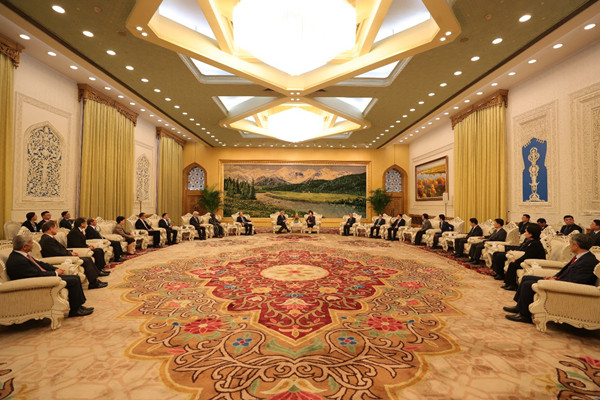
Vice Premier Sun Chunlan meeting with international representative of GAB
So as to better promote the overall development and enhance the international influence of SPPM of Tsinghua University, and to better serve the goal of national governance, SPPM decided to set up the GAB, which will play an important role in introducing China to the world and providing Chinese experience and solutions for global governance. GAB is composed of 34 experts and scholars, business elites and political leaders from 11 countries and regions, aimed at providing forward-looking, strategic guidance and suggestions for the teaching and research work of SPPM, and for the construction and development of a modern national governance system.
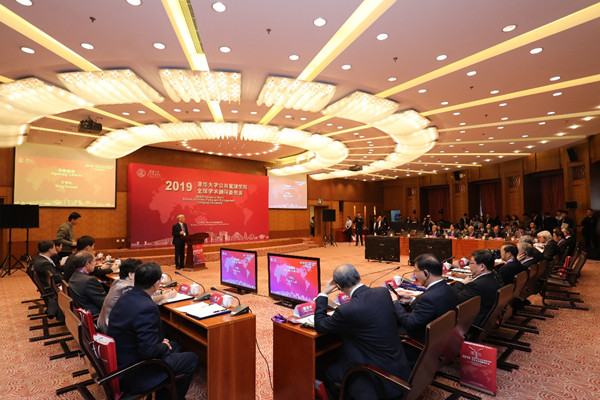
Tsinghua SPPM Inaugural GAB Meeting
At the inaugural meeting, Qiu Yong, on behalf of Tsinghua University, extended a warm welcome to the distinguished guests. He recognized the outstanding achievements made by Tsinghua SPPM in terms of academic research, talent training, think tank building and social service over the years. Qiu Yong pointed out that the establishment of GAB of SPPM is a remarkable event of Tsinghua University, which comes a long way in Tsinghua’s efforts to build a world-class public management discipline and is of strategic significance to the future development of SPPM. The 4th Plenary Session of the 19th CPC Central Committee, which has just concluded, has made a comprehensive plan in adhering to and improving the socialist system with Chinese characteristics and promoting the modernization drive of national governance system and governance capacity. This plan has also put forward a new historical mission for the development of public management discipline. He expected all GAB members to express their views, speak freely, and continue to contribute wisdom and strength into the reform and development of Tsinghua’s public management discipline.
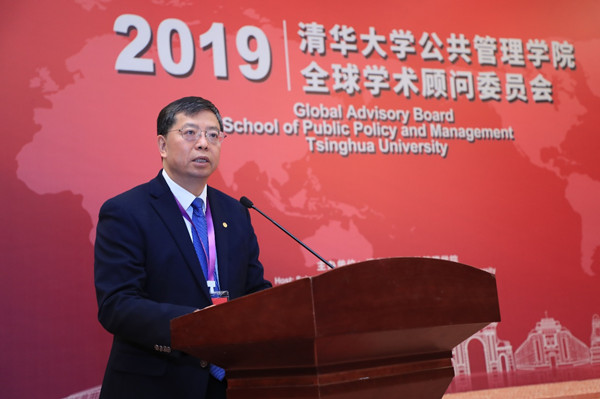
Qiu Yong delivering welcome speech
Ding Zhongli regards the establishment of GAB as an important milestone for Tsinghua SPPM to become a world-class school of public management. GAB is of great significance to review China's governance experience, promote the governance practice, disseminate the governance wisdom and enrich the achievements of global governance. As a member of GAB, he will actively participate in the building of SPPM and continuously contribute to the development of China’s public management discipline and the idea of global governance.
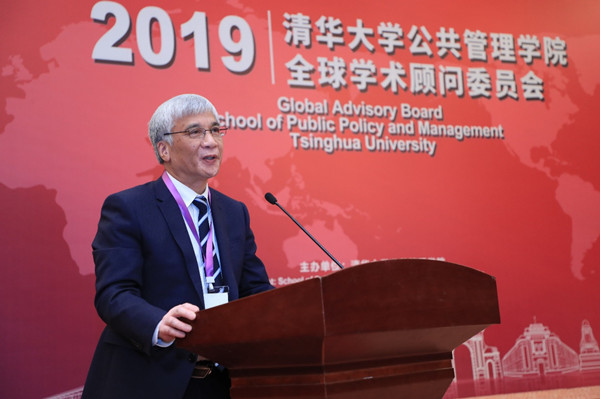
Ding Zhong addressing all attendees
Wan Gang believes that the setting up of GAB will better integrate the wisdom and strength of all aspects, accelerate the pace of building a world-class school of public management, which would have an important impact on promoting China's public management course and perfecting the global governance system. As a member of the board, he hopes to strengthen the close cooperation between Tsinghua University and the China Association of Science and Technology, especially in the fields of scientific, technological innovation and governance, working together to promote global scientific and technological governance.
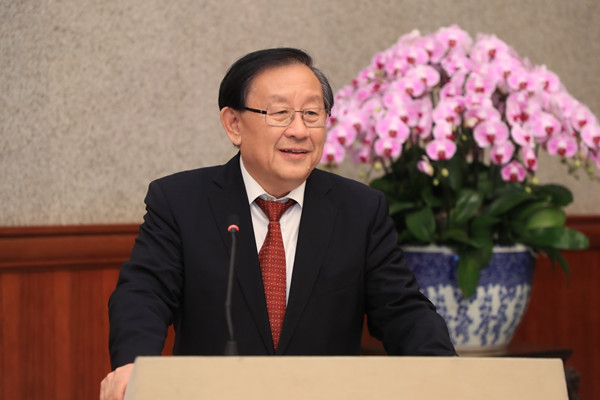
Wan Gang addressing all attendees
Jiang Xiaojuan, dean of SPPM, first introduced the composition of the first GAB and awarded the board members a letter of appointment, after which she reported to the members on the development and future planning of SPPM. Jiang Xiaojuan said that at the time when the 4th Plenary Session of the 19th CPC Central Committee had just closed, which put forward the major strategic tasks in adhering to and perfecting the socialist system with Chinese characteristics and promoting the modernization drive of the national governance system and governance capacity, facing the new situation, new environment, and new challenges, SPPM would consider it as its own mission to build a public management theoretical system with Chinese characteristics, to engage in the modernization practice of national governance and the dialogue on global governance, as well as to promote global governance and build up an exchange and cooperation platform for China and global governance. To that end, SPPM will step up efforts to make itself a world-class school of public management and make new contributions for greater well-being and progress of the mankind.
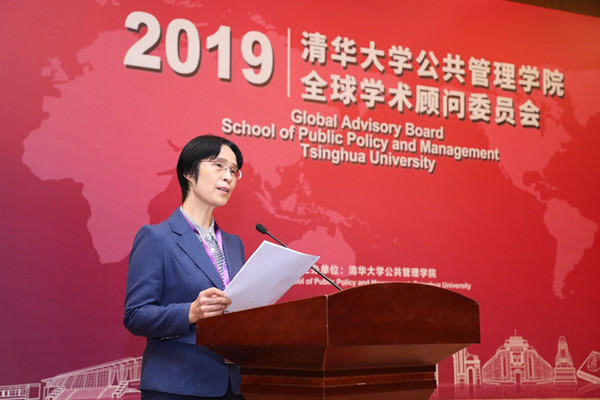
Jiang Xiaojuan delivering report
Xue Lan, Senior Professor at Tsinghua University and Chairman of the Academic Committee of SPPM, delivered a report on the global development strategy of SPPM. He said that globalization is both the development goal and an important driving force of SPPM. China's rise in global profile and the implementation of Tsinghua global strategy have provided new opportunities for the globalization drive of SPPM. In the future, SSPM will continue to construct an integrated international development framework of discipline building, talent training, teaching staff, scientific research, international cooperation and communication, and form a global development strategy of integrating international think tanks, associations and international organizations.
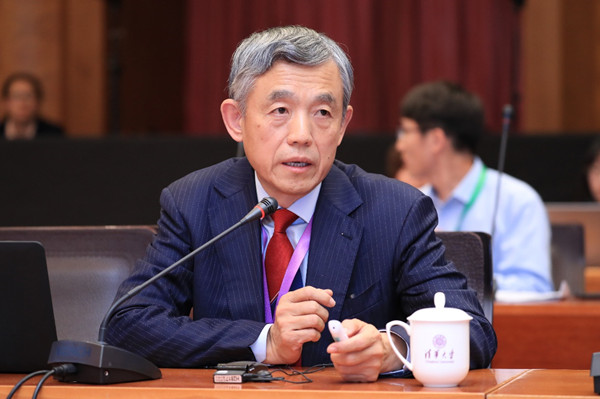
Xue Lan delivering report
The first GAB meeting was hosted by the co-chairs Zhou Xiaochuan and Robert J. Zimmer, President of the University of Chicago.
Zhou Xiaochuan stressed that GAB would deliver its responsibility by making suggestions and recommendations actively to guide the development of SPPM and make concerted efforts to making SPM a world-class school of public management. In addition, the board will promote the modernization drive of national governance system and governance capacity, to promote the common development of China and the whole world.
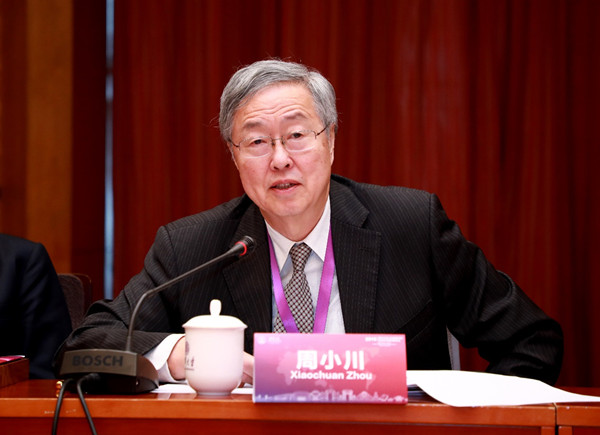
Zhou Xiaochuan hosting the meeting
According to Robert J. Zimmer, China has generated many valuable experiences and great achievements in the past few decades. It is particularly important to introduce China's experience into other developing countries, as China's development mode is naturally more applicable to other developing countries, and thus it is necessary to think deeply about the foundation and connotation of China's governance model.
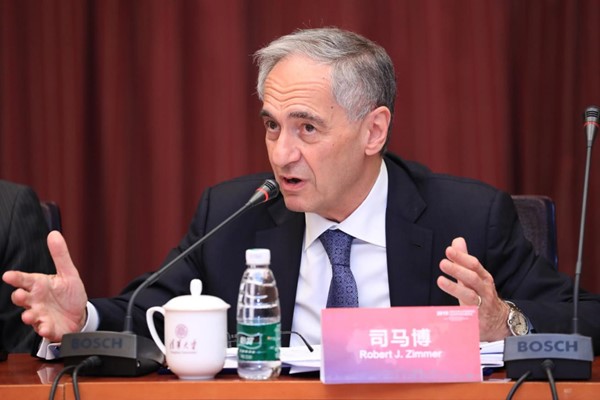
Robert J. Zimmer hosting the meeting
At the meeting, GAB members actively carried on in-depth exploration of and offered suggestions on hot issues of public governance at home and abroad, the China solution for the reform and improvement of global governance, the international experience of public governance, and the promotion of governance research and cooperation in the network and digital era, etc.
John L. Thornton, Executive Chairman of Barrick Gold Corporation, Chair Emeritus of the Brookings Institution and Co-Chair of the Board of Trustees of the Asia Society, Paul Romer, University Professor in Economics of New York University and Nobel Laureate in Economics, Margaret Chan, 7th Director General of the World Health Organization and President of the Global Health Forum of the Boao Forum for Asia, Danny Quah, Dean of the Lee Kuan Yew School of Public Policy, National University of Singapore, Chen Qingtai, former Secretary of the Communist Party of China of the Development Research Center of the State Council, former Vice Chairman of the National Economic and Trade Commission and first Dean of the School of Public Policy and Management, Tsinghua University, Xie Fuzhan, President of the Chinese Academy of Social Sciences and former Party Secretary of Henan Province, and Lou Jiwei, Standing Committee Member and Chairman of the Committee of Foreign Affairs of the 13th National Committee of the Chinese People’s Political Consultative Conference, Chairman of the Society of Public Finance of China and Vice-Chairman of the China Economic and Social Council and other members agreed that China's development model has been based on China’s unique historical culture and rich experience, and should remain being rooted in China's national conditions and cultural origins in the future. That how does the cultural factors behind the Chinese model affect and help spread the Chinese model to the world shall be further explored. It is expected that Tsinghua SPPM will represent China and actively participate in international exchanges and dialogues in order to help the international community and the public to better understand the Chinese governance model.
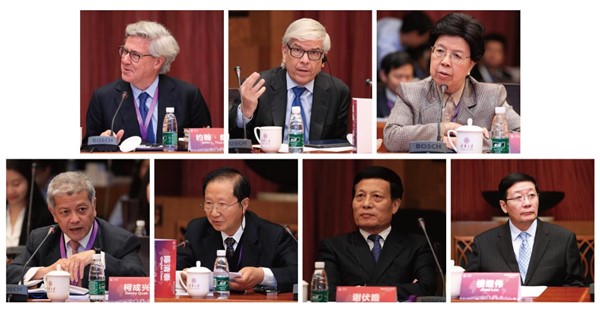
The first row above are John L. Thornton, Paul Romer and Margaret Chan (from left to right)
The second row above are Danny Quah, Chen Qingtai, Xie Fuzhan and Lou Jiwei (from left to right)
Wu Hongbo, former Under Secretary-General of the United Nations, Adjunct Professor and Co-Director of Institute for Sustainable Development Goals of Tsinghua University, Ngozi Okonjo-Iweala, Chair of the Board of the Global Alliance for Vaccines and Immunization, former Finance Minister and Foreign Minister of Nigeria and former Managing Director of the World Bank, Robert Orr, Dean of the School of Public Policy, University of Maryland, President of the Network of Schools of Public Policy, Affairs, and Administration, former Assistant Secretary-General of the United Nations and special advisor to the UN Secretary-General on Climate, Chen Deming, former Minister of Commerce and former Chairman of the Association for Relations Across the Taiwan Straits, and Ma Huateng, Tencent’s Chairman of the Board and Chief Executive Officer and other members suggested to promote the reform and development of public governance by establishing a public governance mechanism with diversified participants, especially the private sector and NGOs to promote the governance research and cooperation in the Internet and digital age and revitalize the credibility of the public sector. It is hoped that the research of Tsinghua SPPM will devote itself to promoting practice and serving the progress of global public governance.

Wu Hongbo, Ngozi Okonjo-Iweala, Robert Orr and Chen Deming (from left to right)
Shigeo Katsu, President of Nazarbayev University and former Vice President of the World Bank, Aiji Tanaka, President of Waseda University, Frédéric Mion, President of Science Po, Yong-Hak Kim, President of Yonsei University, and Jack Ma, founder of Jack Ma Foundation, United Nations Sustainable Development Goals Advocate and Partner of Alibaba Group, and other members believe that talent training is very important in global governance. Tsinghua SPPM is expected to formulate a strategic plan in accordance with its future vision, to incorporate the concept of education into the strategic plan, pay attention to the overall view, to future view and global view of students and produce more global leaders so as to meet the challenges of global governance.
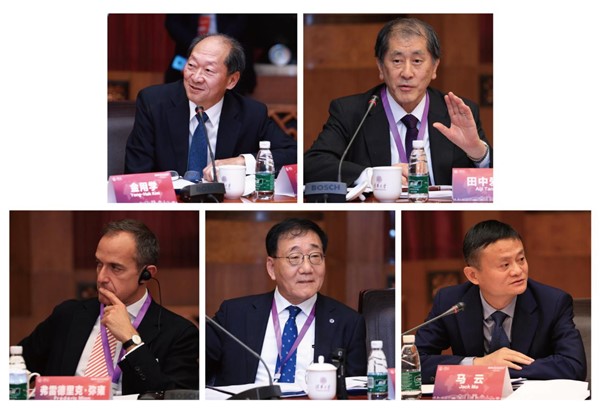
The first row above are Shigeo Katsu and Aiji Tanaka (from left to right)
The second row are Frédéric Mion, Yong-Hak Kim and Jack Ma (from left to right)
GAB members all agreed that the comprehensive interdisciplinary advantages, the sound educational and research environment and the excellent student training tradition of Tsinghua University lay a solid foundation for the construction and development of the public management discipline. GAB will continue to strengthen the communication between SPPM and the outside world, enhance the talent training capacity in the field of public management, foster international exchanges and dialogues, and continuously promote the international community’s understanding of the China’s public management.
Zhou Xiaochuan, domestic Chairman of GAB, concluded the meeting. He pointed out that the members’ discussion not only guides the development planning of the Tsinghua SPPM, but also sheds light on how to improve the Chinese governance system, how to introduce China’s governance into other countries, how to respond to global governance challenges and promote global governance. He expected that GAB should gather wisdom, group efforts and make suggestions, and continue to promote the development of SPPM, and jointly push forward the global public governance.
School of Public Policy and Management of Tsinghua University was established in October 2000, aimed at building a world-class school of public management, with serving China’s development, increasing people’s well-being and promoting human development as its mission. The academic performance of SPPM has been widely recognized and has been evaluated as A+ in both the national first-level discipline evaluation and professional degree assessment of public management.